
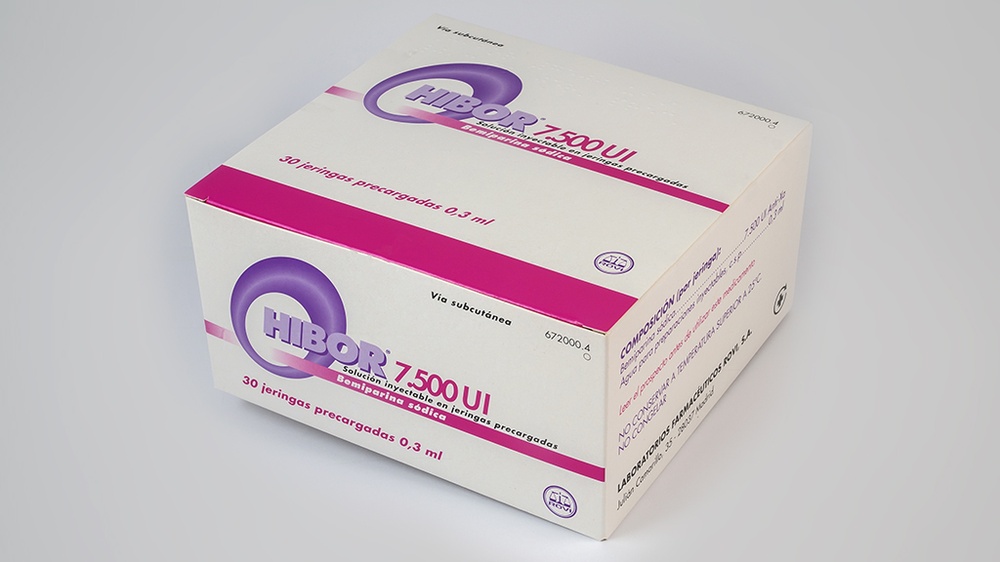
HIBOR 7.500 UI Anti-Xa / 0,3 ml SOLUÇÃO INJETÁVEL EM SERINGAS PREENCHIDAS

Pergunte a um médico sobre a prescrição de HIBOR 7.500 UI Anti-Xa / 0,3 ml SOLUÇÃO INJETÁVEL EM SERINGAS PREENCHIDAS

Como usar HIBOR 7.500 UI Anti-Xa / 0,3 ml SOLUÇÃO INJETÁVEL EM SERINGAS PREENCHIDAS
Introdução
Prospecto: informação para o utilizador
HIBOR 7.500 UI anti Xa/0,3 ml
solução injetável em seringas pré-carregadas
Bemiparina sódica
Leia todo o prospecto atentamente antes de começar a usar este medicamento, porque contém informações importantes para si.
- Conserva este prospecto, porque pode ter que voltar a lê-lo.
- Se tiver alguma dúvida, consulte o seu médico, farmacêutico ou enfermeiro.
- Este medicamento foi-lhe prescrito apenas para si e não deve dá-lo a outras pessoas, mesmo que tenham os mesmos sintomas que si, porque pode prejudicá-las.
- Se experimentar efeitos adversos, consulte o seu médico, farmacêutico ou enfermeiro, mesmo que se trate de efeitos adversos que não aparecem neste prospecto. Ver secção 4
Conteúdo do prospecto:
- O que é HIBOR 7.500 UI e para que é utilizado
- O que necessita saber antes de usar HIBOR 7.500 UI
- Como usar HIBOR 7.500 UI
- Possíveis efeitos adversos
- Conservação de HIBOR 7.500 UI
- Conteúdo do envase e informações adicionais
1. O que é HIBOR 7.500 UI e para que é utilizado
O princípio ativo de HIBOR é bemiparina sódica, que pertence a um grupo de medicamentos chamados anticoagulantes. Estes medicamentos ajudam a que o sangue não se coagule nas veias.
HIBOR 7.500 UI é utilizado para tratar coágulos de sangue perigosos que se formam, por exemplo, nas veias das pernas e/ou dos pulmões (trombose venosa profunda com/sin embolia pulmonar).
2. O que necessita saber antes de usar HIBOR 7.500 UI
Não use HIBOR 7.500 UI
- Se é alérgico a bemiparina sódica, heparina ou um produto semelhante (como enoxaparina, dalteparina, nadroparina) ou a algum dos outros componentes deste medicamento (incluídos na secção 6).
- Se teve alguma reação alérgica após ter sido tratado com algum medicamento que contenha heparina.
- Se é alérgico a alguma substância derivada do porco.
- Se padece Trombocitopenia Induzida por Heparina (TIH), uma doença que provoca um descenso importante no número de plaquetas (ou, se como resultado de TIH, sofre outra doença que se chama Coagulação Intravascular Disseminada (CID), na qual as plaquetas se agrupariam se utilizasse HIBOR).
- Se tem uma doença chamada endocardite (inflamação das paredes do coração e das válvulas cardíacas).
- Se padece algum tipo de distúrbio que lhe provoca uma tendência a sangrar de forma excessiva.
- Se tem um distúrbio grave de fígado ou de pâncreas.
- Se sofre algum tipo de dano ou lesão nos seus órgãos internos que pudessem implicar um alto risco de sangramento interno (por exemplo, úlceras de estômago ativa, aneurismas cerebrais [inflamação das paredes das artérias do cérebro] ou tumores cerebrais).
- Se teve uma hemorragia cerebral.
- Se teve ou tem uma lesão ou vai a ser operado no cérebro, na medula espinhal, nos olhos e/ou nos ouvidos nos 2 últimos meses.
- Se está utilizando HIBOR, não lhe poderão administrar anestesia epidural ou espinal (um anestésico injetado na medula espinhal) porque poderia ser perigoso. Por isso, certifique-se de que o seu médico sabe que está utilizando HIBOR antes de qualquer operação.
Advertências e precauções
Consulte o seu médico antes de começar a usar HIBOR 7.500 UI.
- Se está doente do fígado.
- Se está doente dos rins. O seu médico poderia considerar fazer-lhe um seguimento especial. Em caso de que a sua doença fosse grave, o seu médico poderia considerar necessário um ajuste de dose.
- Se a sua tensão arterial é alta e/ou difícil de controlar.
- Se teve alguma vez úlcera de estômago que já não está ativa.
- Se tem trombocitopenia, uma doença na qual há menos plaquetas do que o normal no sangue, que provoca moratões e que se sangra facilmente.
- Se tem pedras nos rins ou na bexiga.
- Se tem algum tipo de doença que provoca que sangre com facilidade.
- Se tem problemas nos olhos devido a problemas nos vasos sanguíneos.
- Se tem diabetes.
- Se os resultados dos seus análises mostraram que tem os níveis de potássio no sangue elevados.
- Certifique-se por partida dupla de que o seu médico sabe que está usando HIBOR se lhe vão fazer uma punção lombar (um pinchazo na parte mais baixa da coluna vertebral para fazer-lhe análises).
Uso de HIBOR 7.500 UI com outros medicamentos
Informa o seu médico se está utilizando, utilizou recentemente ou poderia ter que utilizar qualquer outro medicamento.
Consulte o seu médico se acredita que poderia estar utilizando:
- Qualquer medicamento que se injete no músculo, porque estas injeções devem ser evitadas enquanto estiver em tratamento com HIBOR.
- Outros anticoagulantes como a warfarina e/ou acenocumarol (antagonistas da vitamina K), para tratar e/ou prevenir os coágulos sanguíneos.
- Anti-inflamatórios não esteroideos, como o ibuprofeno, por exemplo, para a artrite.
- Corticoides como a prednisolona, para tratar doenças inflamatórias, como a artrite.
- Inibidores plaquetários, como a aspirina, ticlopidina ou clopidogrel, para prevenir coágulos no sangue.
- Medicamentos que possam aumentar os níveis de potássio no sangue, como alguns diuréticos e anti-hipertensivos (usados para reduzir a tensão arterial).
- Medicamentos para aumentar o volume do sangue, como o dextrano.
- Um medicamento injetável para problemas de coração que se chama nitroglicerina.
Análises especiais que pode necessitar
- Alguns pacientes podem necessitar ter controlado o nível de plaquetas no sangue. O seu médico decidirá se é necessário e quando (por exemplo, antes de iniciar tratamento, no primeiro dia de tratamento, posteriormente cada 3 ou 4 dias até finalizar o tratamento).
- Se tem determinadas doenças (diabetes, doença dos rins) ou se está tomando medicamentos para não perder potássio, pode que o seu médico controle os níveis de potássio no sangue.
Gravidez e lactação
Se está grávida ou em período de lactação, acredita que possa estar grávida ou tem intenção de ficar grávida, consulte o seu médico ou farmacêutico antes de utilizar este medicamento.
Condução e uso de máquinas
HIBOR não afeta a capacidade de conduzir e utilizar máquinas.
3. Como usar HIBOR 7.500 UI
Siga exatamente as instruções de administração deste medicamento indicadas pelo seu médico, farmacêutico ou enfermeiro. Em caso de dúvida, pergunte ao seu médico, farmacêutico ou enfermeiro.
HIBOR é injetado por baixo da pele, geralmente em um dobra da pele de um lado da cintura (abdomen) ou na parte alta da anca. Normalmente, o seu médico ou enfermeira lhe porão a injeção no hospital. Pode que necessite continuar a receber HIBOR quando voltar para casa.
Este medicamento nunca deve ser injetado em um músculo ou misturado com qualquer outra injeção. Normalmente é administrado uma vez ao dia.
O seu médico lhe dirá por quanto tempo lhe devem administrar este medicamento.
Se o seu médico lhe disse que você mesmo pode injetar este medicamento, siga cuidadosamente as instruções do seu médico (Ver secção “Como me injeto HIBOR?”).
A dose recomendada é:
Adultos (18-64 anos)
A dose diária dependerá do seu peso corporal. Se você pesa:
- Menos de 50 quilos, a dose será de 0,2 mililitros (= 5.000 UI).
- Entre 50 e 70 quilos, a dose será de 0,3 mililitros ( = 7.500 UI).
- Entre 71 e 100 quilos, a dose será de 0,4 mililitros ( = 10.000 UI).
- Entre 101 e 120 quilos, a dose será de 0,5 mililitros ( = 12.500 UI).
- Mais de 120 quilos, a dose será ajustada, em função do seu peso exato, ao equivalente de 115 UI diárias por cada quilograma de peso.
UI: a potência deste medicamento é descrita em unidades internacionais de atividade anti Xa.
Idosos(a partir de 65 anos)
Recebem, por lo geral, a mesma dose que outros pacientes adultos. Se tem problemas de fígado ou rins, por favor, comunique ao seu médico, é possível que decida fazer-lhe um seguimento muito de perto. Se a sua doença dos rins é leve ou moderada, não se considera necessário um ajuste de dose.
Pacientes com insuficiência renal
Em caso de que a sua doença dos rins seja grave, o seu médico poderia considerar necessário um ajuste de dose ao 75% (aproximadamente 85 UI anti-Xa/kg uma vez ao dia).
Se a sua doença dos rins é leve ou moderada, não é necessário realizar ajuste de dose.
Pacientes com insuficiência hepática
Não existem dados suficientes para que o seu médico lhe recomende um ajuste de dose.
Uso em crianças e adolescentes
HIBOR não é recomendado em crianças.
Como me injeto HIBOR?
HIBOR nunca deve ser injetado em um músculo porque poderia provocar um sangramento dentro do músculo. Antes de se pôr a primeira injeção, você deverá receber instruções sobre a forma correta de utilizar este medicamento e sobre a técnica correta de auto-injeção. Estas instruções devem ser dadas por um médico ou outro profissional de saúde devidamente qualificado.
Deve seguir estes passos:
- Lave bem as mãos e se sente ou deite em uma posição confortável.
- Escolha uma zona da cintura que esteja, pelo menos, a 5 centímetros do umbigo e de qualquer cicatriz ou moratão, e limpe bem a pele dessa zona.
- Utilize cada dia sítios diferentes para a injeção, por exemplo, primeiro no lado esquerdo e a próxima vez no direito.
- Retire o capuchão que tapa a agulha da seringa de HIBOR.
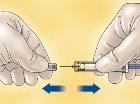
- Para manter a agulha estéril, certifique-se de que não toca nada.
- A seringa pré-carregada já está pronta para usar.
- Antes da injeção, não empurre o êmbolo para eliminar as bolhas de ar, porque pode perder medicamento.
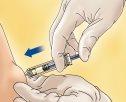
- Pegue a seringa com uma mão e com a outra, usando os dedos índice e polegar, pegue um dobra da zona da pele que havia limpo para formar um dobra.
- Introduza a agulha inteira no dobra da pele mantendo a seringa o mais erguida possível sobre a superfície do corpo, em um ângulo de 90º.
- Empurre o êmbolo certificando-se de que mantém o dobra da pele na mesma posição até que o êmbolo esteja todo para baixo.
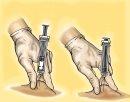
- Retire a seringa do local da injeção mantendo o dedo sobre o êmbolo e a seringa erguida. Solte o dobra da pele.

- Para seringas com dispositivo de segurança: Oriente a agulha longe de você e de qualquer um que se encontre presente, ative o sistema de segurança pressionando firmemente sobre o êmbolo. A capa protetora cobrirá automaticamente a agulha e você perceberá um clique audível que confirmará a ativação do protetor.

- Elimine imediatamente a seringa jogando-a no contenedor de objetos pontiagudos mais próximo (a agulha para dentro), feche bem o contenedor com a tampa e coloque-o fora do alcance das crianças.
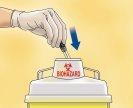
Advertências:
- O sistema de segurança só pode ser ativado uma vez que a seringa esteja vazia.
- A ativação do sistema de segurança só deve ser feita após retirar a agulha da pele do paciente.
- Não reutilize a proteção da agulha após a injeção.
- A ativação do sistema de segurança pode salpicar uma mínima quantidade de líquido. Para a sua máxima segurança, ative o sistema de segurança orientando-o para baixo e longe de você e de qualquer um que esteja presente.
- Não esfregue a pele onde se pôs a injeção. Isso ajudará a evitar que saiam moratões.
Se estima que o efeito de HIBOR 7.500 UI é demasiado forte (por exemplo, porque experimenta um sangramento inesperado) ou débil (por exemplo, porque a dose não parece funcionar) comunique ao seu médico ou farmacêutico.
Se usa mais HIBOR 7.500 UI do que deve
Isso pode provocar um sangramento. Nesse caso, consulte imediatamente o seu médico ou dirija-se ao serviço de urgências do hospital mais próximo com este prospecto.
Em caso de sobredose ou administração acidental, ligue para o Serviço de Informação Toxicológica. Telefone 91 562 04 20, indicando o medicamento e a quantidade administrada.
Se esqueceu de usar HIBOR 7.500 UI
Não use uma dose dupla para compensar as doses esquecidas. Se isso lhe acontecer, deve consultar o seu médico o mais rápido possível para que lhe indique o que deve fazer.
Se interrompeu o tratamento com HIBOR
Consulte sempre o seu médico antes de deixar de usar este medicamento.
Se tiver alguma outra dúvida sobre o uso deste medicamento, pergunte ao seu médico, farmacêutico ou enfermeiro.
4. Possíveis efeitos adversos
Como todos os medicamentos, este medicamento pode produzir efeitos adversos, embora nem todas as pessoas os sofram.
Deixe de utilizar HIBOR e consulte imediatamente o seu médico ou enfermeira (ou vá imediatamente ao serviço de urgências do hospital mais próximo), se sofrer algum dos seguintes efeitos adversos:
Frequentes(podem afetar entre 1 e 10 de cada 100 pacientes):
- Sangramento inusual ou inesperado, por exemplo, que haja sangue na urina ou fezes, podendo ocasionar anemia hemorrágica.
Raros(podem afetar entre 1 e 10 de cada 1.000 pacientes):
- Descenso grave no número de plaquetas (Trombocitopenia tipo II), que pode levar à aparência de moratões, sangramento de gengivas, nariz e boca, erupções.
- Lesões na pele (necrose) nos pontos de injeção.
- Se lhe foi feita uma punção lombar ou lhe foi administrada anestesia epidural ou espinal, HIBOR pode ocasionar um sangramento na medula espinhal e a formação de hematomas. Isso poderia provocar uma perda de força ou de sensibilidade nas pernas e na parte inferior do corpo e/ou incontinência de fezes e urina. Esses hematomas podem ocasionar distintos graus de deficiência, incluindo paralisia durante tempo prolongado ou permanente. Se isso acontecer, deixe de usar HIBOR 7.500 UI e comunique ao seu médico ou enfermeira.
- Reações alérgicas graves (subida da temperatura do corpo, tremor, dificuldade para respirar, inchação das cordas vocais, tontura, suor, urticária, erupção, coceira, baixa da tensão arterial, sofocos, enrubescimento, síncope, contração do tubo bronquial, inchação da laringe).
Outros efeitos adversos:
Muito frequentes (afetam mais de 1 paciente de cada 10):
- Moratões, manchas na pele, coceira e um pouco de dor nas áreas onde injetou o medicamento.
Frequentes (podem afetar entre 1 e 10 de cada 100 pacientes):
- Um aumento leve e transitório de certas enzimas (transaminases) no fígado, que poderia aparecer nos análises de sangue.
Pouco frequentes (podem afetar pelo menos 10 de cada 1.000 pacientes):
- Reações alérgicas leves na pele (sarpullido, erupção cutânea, urticária, prurito, bexiga).
- Descenso leve e transitório do número de plaquetas (Trombocitopenia tipo I), que poderia aparecer nos análises de sangue.
Frequência não conhecida (não pode ser estimada a partir dos dados disponíveis):
- Hiperpotassemia (aumento dos níveis de potássio no sangue).
- Fragilidade de ossos (osteoporose) que se associou ao uso prolongado de tratamento com heparina.
Comunicação de efeitos adversos:
Se experimentar qualquer tipo de efeito adverso, consulte o seu médico, farmacêutico ou enfermeiro, mesmo que se trate de possíveis efeitos adversos que não aparecem neste prospecto. Também pode comunicá-los diretamente através do Sistema Español de Farmacovigilancia de medicamentos de Uso Humano: https://www.notificaRAM.es. Mediante a comunicação de efeitos adversos, você pode contribuir para proporcionar mais informações sobre a segurança deste medicamento.
5. Conservação de HIBOR 7.500 UI
Mantenha este medicamento fora da vista e do alcance das crianças.
Não conserve a uma temperatura superior a 25ºC. Não congele.
Não utilize este medicamento se observar:
- Que o envase protetor está aberto.
- Que o envase protetor está danificado.
- Que o medicamento contido na seringa está turvo.
- Partículas pequenas no medicamento.
Uma vez aberto o blister que contém a seringa, o medicamento deve ser utilizado imediatamente.
Data de validade
Não utilize este medicamento após a data de validade que aparece no envase após de CAD.
A data de validade é o último dia do mês que se indica.
Eliminação
Este medicamento é apresentado em seringas para um só uso.
Deposite as seringas usadas em um contenedor de resíduos perigosos.
Não as guarde após usá-las.
Os medicamentos não devem ser jogados nos deságues nem na lixeira. Deposite os envases e os medicamentos que não necessita no Ponto SIGRE da farmácia. Em caso de dúvida, pergunte ao seu farmacêutico como se livrar dos envases e dos medicamentos que não necessita. Dessa forma, ajudará a proteger o meio ambiente.
6. Conteúdo do envase e informação adicional
Composição de HIBOR 7.500 UI
O princípio ativo é: Bemiparina sódica 7.500 UI
Os demais componentes são: Água para injetáveis.
Aspecto do produto e conteúdo do envase
O medicamento contido nas seringas é uma solução transparente, incolor ou ligeiramente amarelada, sem partículas visíveis.
HIBOR 7.500 UI está disponível em caixas de 2, 10, 30 e 50 seringas precarregadas. Cada seringa contém 0,3 ml de solução. Cada seringa de 0,3 ml proporciona uma dose de bemiparina sódica de 7.500 UI.
Título da autorização de comercialização e responsável pela fabricação
Título da autorização de comercialização
LABORATÓRIOS FARMACÊUTICOS ROVI, S.A.
Rua Julián Camarillo, 35
28037 MADRI
Responsável pela fabricação
ROVI Pharma Industrial Services, S.A.
Rua Julián Camarillo, 35
28037 MADRI
LABORATÓRIOS FARMACÊUTICOS ROVI, S.A.
Rua Julián Camarillo, 35
28037 MADRI
Data da última revisão deste prospecto: 05/2023
A informação detalhada deste medicamento está disponível na página web da Agência Espanhola de Medicamentos e Produtos Sanitários (AEMPS) http://www.aemps.gob.es/

Quanto custa o HIBOR 7.500 UI Anti-Xa / 0,3 ml SOLUÇÃO INJETÁVEL EM SERINGAS PREENCHIDAS em Espanha em 2025?
O preço médio do HIBOR 7.500 UI Anti-Xa / 0,3 ml SOLUÇÃO INJETÁVEL EM SERINGAS PREENCHIDAS em dezembro de 2025 é de cerca de 166.05 EUR. Os valores podem variar consoante a região, a farmácia e a necessidade de receita. Confirme sempre com uma farmácia local ou fonte online para obter informações atualizadas.
- País de registo
- Preço médio em farmácia166.05 EUR
- Substância ativa
- Requer receita médicaSim
- Fabricante
- Esta informação é apenas para referência e não constitui aconselhamento médico. Consulte sempre um médico antes de tomar qualquer medicamento. A Oladoctor não se responsabiliza por decisões médicas baseadas neste conteúdo.
- Alternativas a HIBOR 7.500 UI Anti-Xa / 0,3 ml SOLUÇÃO INJETÁVEL EM SERINGAS PREENCHIDASForma farmacêutica: INJETÁVEL, 10000/UISubstância ativa: bemiparinFabricante: Laboratorios Farmaceuticos Rovi S.A.Requer receita médicaForma farmacêutica: INJETÁVEL, 12.500 UISubstância ativa: bemiparinFabricante: Laboratorios Farmaceuticos Rovi S.A.Requer receita médicaForma farmacêutica: INJETÁVEL, 2500 UISubstância ativa: bemiparinFabricante: Laboratorios Farmaceuticos Rovi S.A.Requer receita médica
Alternativas a HIBOR 7.500 UI Anti-Xa / 0,3 ml SOLUÇÃO INJETÁVEL EM SERINGAS PREENCHIDAS noutros países
As melhores alternativas com o mesmo princípio ativo e efeito terapêutico.
Alternativa a HIBOR 7.500 UI Anti-Xa / 0,3 ml SOLUÇÃO INJETÁVEL EM SERINGAS PREENCHIDAS em Polska
Alternativa a HIBOR 7.500 UI Anti-Xa / 0,3 ml SOLUÇÃO INJETÁVEL EM SERINGAS PREENCHIDAS em Ukraina
Médicos online para HIBOR 7.500 UI Anti-Xa / 0,3 ml SOLUÇÃO INJETÁVEL EM SERINGAS PREENCHIDAS
Avaliação de posologia, efeitos secundários, interações, contraindicações e renovação da receita de HIBOR 7.500 UI Anti-Xa / 0,3 ml SOLUÇÃO INJETÁVEL EM SERINGAS PREENCHIDAS – sujeita a avaliação médica e regras locais.














